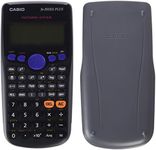Buying Guide for the Best Scientific Calculators
Choosing the right scientific calculator can greatly enhance your efficiency and accuracy in solving mathematical problems, whether you're a student, engineer, or scientist. Scientific calculators are designed to handle a wide range of functions beyond basic arithmetic, including trigonometry, logarithms, and complex equations. When selecting a scientific calculator, consider the types of calculations you'll be performing most frequently and the level of complexity you need. It's also important to think about the ease of use and the layout of the calculator, as a well-organized interface can save time and reduce errors.FunctionalityFunctionality refers to the range of operations a scientific calculator can perform. This is crucial because it determines what mathematical tasks you can accomplish with the device. Basic scientific calculators offer functions like square roots, exponents, and trigonometric calculations, which are suitable for high school students and basic college courses. More advanced models include calculus functions, matrix operations, and statistical analysis, which are ideal for engineering students and professionals. Consider your current and future needs; if you're advancing in your studies or career, a calculator with more functions might be beneficial.
Display TypeThe display type of a scientific calculator affects how information is presented and interpreted. A simple one-line display is sufficient for basic calculations, but a multi-line display allows you to view complex equations and results simultaneously, which is helpful for verifying calculations and understanding step-by-step processes. Graphing calculators, which have larger screens, can display graphs and are useful for visual learners and those dealing with functions and data analysis. Choose a display type that matches your comfort level and the complexity of your work.
Memory CapacityMemory capacity in scientific calculators refers to the ability to store numbers, equations, and sometimes even programs. This is important for saving time and effort, especially when dealing with repetitive calculations or complex problems that require multiple steps. Basic models may have limited memory, suitable for simple tasks, while advanced calculators offer more memory for storing formulas and data sets, which is beneficial for students and professionals working on extensive projects. Consider how often you need to store information and choose a calculator with adequate memory for your needs.
Battery LifeBattery life is an important consideration for scientific calculators, as it determines how long the device can operate before needing a recharge or battery replacement. Calculators with longer battery life are more reliable, especially during exams or fieldwork where access to power sources may be limited. Some calculators use solar power in addition to batteries, extending their usability. If you frequently use your calculator for extended periods, opt for a model with robust battery life or solar capabilities to ensure uninterrupted performance.
Ease of UseEase of use encompasses the design and layout of the calculator's buttons and interface. A user-friendly calculator can significantly reduce the time spent on calculations and minimize errors. Look for calculators with intuitive layouts, clear labeling, and responsive buttons. If you're new to scientific calculators, a simpler model with straightforward navigation might be best. For more experienced users, advanced models with customizable settings can enhance efficiency. Consider your familiarity with scientific calculators and choose one that matches your comfort level.
















